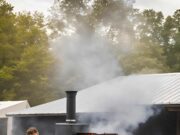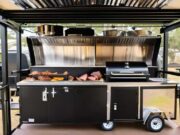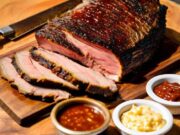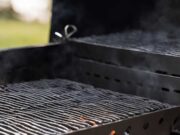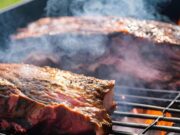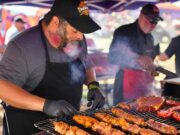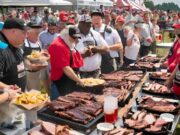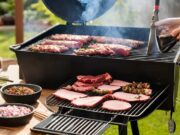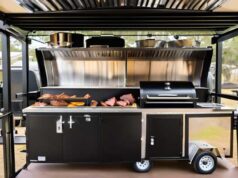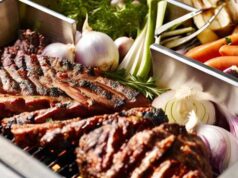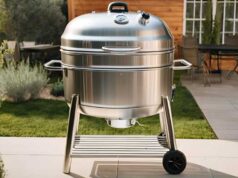BBQ pits on trailers represent a significant advancement for grilling enthusiasts, seamlessly integrating mobility with the rich flavors of outdoor cooking while offering diverse grilling techniques.
Whether one is tailgating, camping, hosting a backyard BBQ, or participating in BBQ competitions, these portable units, or barbecue trailers, provide unparalleled convenience and versatility.
This exploration will highlight the advantages of owning a BBQ pit on a trailer, including cost savings, the variety of models available such as gas grills and charcoal grills, and essential considerations like fire management and heat retention when selecting the ideal unit.
Additionally, guidance will be provided on the proper use, grill maintenance, and safety features of BBQ pits to achieve consistently delicious results.
Engage with this information to enhance your grilling experience.
What is a BBQ Pit on a Trailer?
A BBQ pit mounted on a trailer effectively combines the functionality of traditional BBQ pits with the mobility of a trailer, enabling outdoor cooking enthusiasts to transport their grilling setup to various locations such as tailgating events, camping trips, or backyard gatherings.
These trailer-mounted BBQ units typically feature a range of heat sources, including charcoal, gas, and wood, thereby accommodating diverse grilling preferences and techniques. Constructed with durable materials and heavy-duty construction, they offer ample cooking capacity and can support various grilling accessories, ensuring a convenient and versatile outdoor cooking experience.
Manufactured from high-quality steel or aluminum, these BBQ pits often incorporate insulation to maintain optimal cooking temperatures, making them suitable for both slow smoking and high-temperature grilling. Charcoal models are particularly favored for their ability to impart a traditional smoky flavor, while gas versions provide rapid heating and ease of use, catering to busy cooks. Wood-burning options introduce a unique taste, appealing to those who seek authenticity in their barbecue. Additional features such as removable shelves, built-in thermometers, and side burners further enhance their functionality.
With a wheel configuration designed for effortless transport, these portable cooking stations epitomize convenience, allowing BBQ enthusiasts to pursue their passion on the road.
Benefits of Using a BBQ Pit on a Trailer
Utilizing a BBQ pit mounted on a trailer presents numerous advantages that significantly enhance the outdoor cooking experience, making it suitable for both casual family gatherings and competitive BBQ events, including community gatherings and social events.
These portable grills offer unparalleled convenience, enabling users to transport their equipment effortlessly to various locations, including community events, tailgate parties, grilling parties, or special occasions.
Furthermore, trailer-mounted BBQ units typically include substantial cooking surface areas and features that improve heat distribution, rendering them appropriate for a diverse array of grilling techniques, from smoking meat to traditional barbecuing.
Convenience and Versatility
The convenience and versatility of BBQ pits mounted on trailers render them an essential asset for outdoor cooking enthusiasts, providing a comprehensive solution for grilling on various occasions. Whether it be a family cookout, a community event, or a BBQ competition, these portable grills accommodate a range of cooking methods and heat sources, enabling users to explore different styles of barbecuing.
Many models are equipped with adjustable temperatures, removable racks, and straightforward assembly features, facilitating a quick setup for immediate grilling.
These BBQ pits cater to diverse culinary preferences, allowing for techniques ranging from slow smoking to high-temperature grilling, thereby enhancing the overall user experience. With multiple burners and designated cooking zones, chefs can customize the cooking environment to accommodate various dishes simultaneously, making them particularly suitable for event catering or family gatherings.
Their robust construction ensures durability, enabling these grills to endure the challenges associated with outdoor use. This adaptability not only simplifies meal preparation but also enhances the enjoyment of outdoor kitchens by give the power toing users to host gatherings with confidence and ease.
Cost Savings
Investing in a BBQ pit mounted on a trailer can result in significant cost savings over time, particularly for individuals or businesses that frequently engage in outdoor cooking or BBQ catering. By utilizing a trailer-mounted BBQ, users can minimize expenses related to renting grilling equipment for events and gain the flexibility to prepare meals on-site, which eliminates travel costs and saves time. The durability and heavy-duty construction of these pits often lead to reduced maintenance and cleaning costs, ensuring that the unit remains functional over multiple seasons.
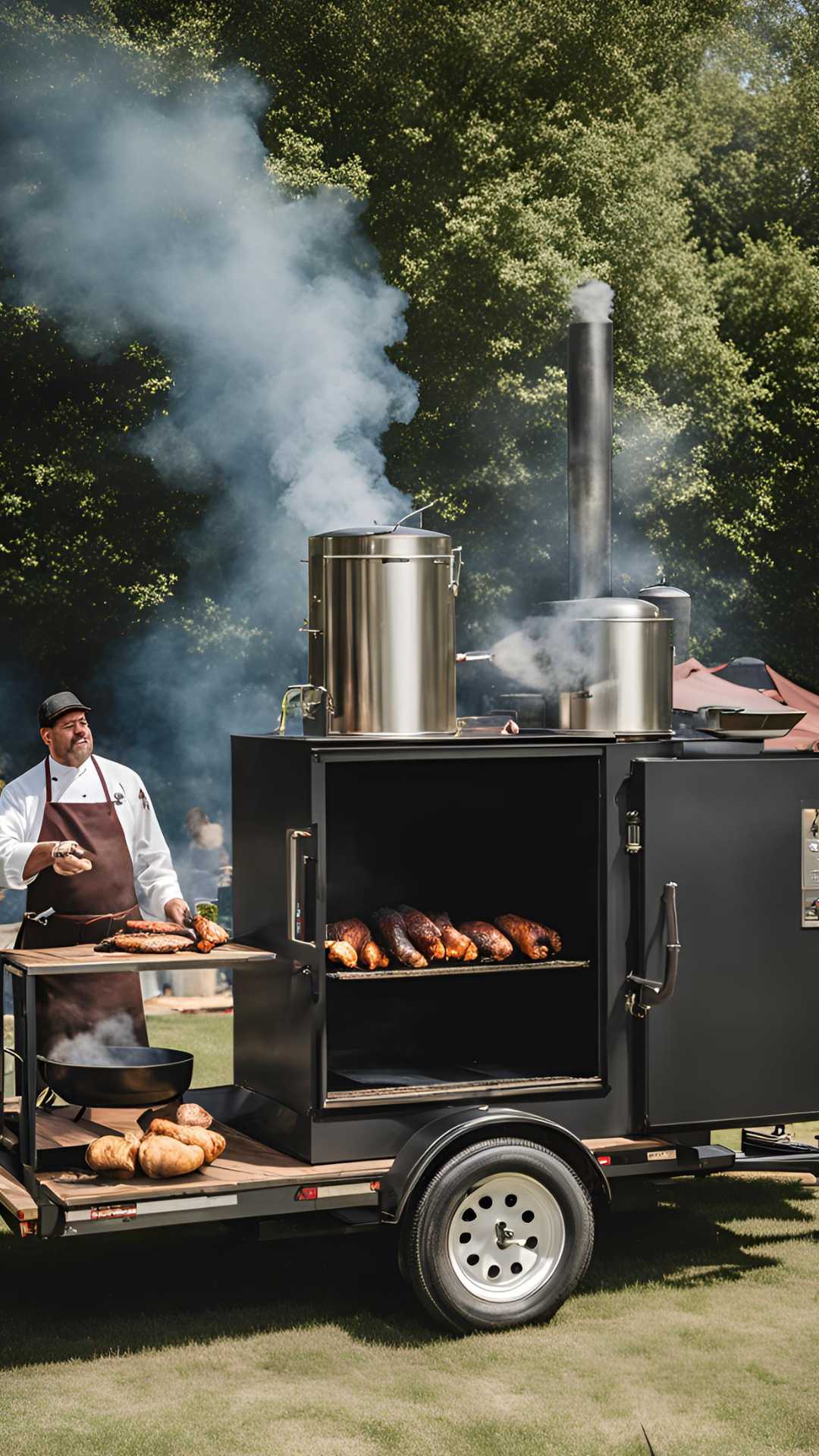
This advantage is particularly critical for event planners and small business owners who aim to maximize profit margins while delivering high-quality meals. With a BBQ pit constructed from long-lasting materials, users can have confidence in their financial investment. Routine maintenance can be streamlined through the use of specialized cleaning tools designed specifically for trailer-mounted BBQs, further extending the life of the equipment.
Such meticulous planning not only fosters reliability but also enhances the overall efficiency of catering operations, making it an excellent choice for culinary entrepreneurs.
Types of BBQ Pits on a Trailer
BBQ pits mounted on trailers are available in a variety of types, each tailored to meet specific grilling preferences and techniques. This diversity ensures that outdoor cooking enthusiasts have access to the appropriate tools for their culinary ventures.
Traditional offset smokers are favored for their capability to impart smoke flavor into meats, while reverse flow smokers offer improved heat distribution, resulting in consistent cooking outcomes.
Furthermore, kamado grills provide versatility with their insulated fireboxes, enabling both grilling and smoking, which makes them particularly suitable for individuals interested in exploring various grilling methods.
Traditional Offset Smokers
Traditional offset smokers are a preferred choice among barbecue enthusiasts, featuring a distinctive design that optimizes heat distribution and imparts a rich smoke flavor to meats. These BBQ smokers employ a separate firebox for the heat source, facilitating lower temperatures and a slower cooking process, which results in tender and flavorful dishes. The expansive cooking surface allows users to prepare large quantities of food, making it particularly suitable for gatherings and barbecue competitions.
The unique configuration enables indirect cooking, allowing for the gradual infusion of smoke without direct exposure to flames, thereby ensuring even cooking results. This method is especially advantageous for cuts of meat such as brisket and ribs, where achieving tenderness is crucial.
The versatility of traditional offset smokers allows them to accommodate a wide variety of meats, from pork shoulders to whole chickens, all of which benefit from the characteristic smokiness. Barbecue enthusiasts value the presence of adjustable dampers in these smokers, which provide precise control over smoke and heat, further enhancing the overall cooking experience.
Reverse Flow Smokers
Reverse flow smokers represent an innovative solution in outdoor cooking, specifically designed to enhance temperature control and heat retention during the smoking process. This type of BBQ smoker ensures that heat circulates uniformly across the cooking surface, resulting in consistent cooking and improved flavor infusion.
The design facilitates a more efficient use of fuel, making it a cost-effective option for extended smoking sessions, suitable for both casual barbecuers and serious competitors.
One of the notable features of reverse flow smokers is their capacity to maintain a stable cooking environment, effectively preventing hot spots that can result in unevenly cooked meats. The unique baffle system aids in redistributing heat, allowing users to experiment with various cooking techniques while achieving exceptional results.
This not only produces tender, juicy dishes but also simplifies the process of smoking larger cuts of meat without the necessity for constant supervision. Consequently, these smokers serve not merely as tools but as reliable companions in any outdoor culinary endeavor, enhancing both efficiency and flavor.
Kamado Grills
Kamado grills are recognized for their remarkable versatility, featuring insulated fireboxes that accommodate a diverse array of cooking techniques, including grilling, smoking, and baking. These traditional ceramic grills are adept at trapping heat, which facilitates precise temperature control and exceptional heat retention, making them suitable for preparing a wide variety of dishes.
The option to incorporate different wood chips and charcoal briquettes enhances flavor infusion, providing a distinctive experience for outdoor cooking enthusiasts.
A notable feature of kamado grills is their capacity to maintain consistent temperatures and heat retention, an essential aspect for techniques such as slow roasting, smoking, and flavor infusion. This characteristic enables chefs to infuse meats and vegetables with rich, deep flavors that emerge from the slow cooking process, effectively drawing out natural juices.
The versatility of these grills makes them ideal for both high-temperature searing and low-and-slow cooking methods, appealing to a broad spectrum of grilling aficionados. Furthermore, the thick ceramic construction not only contributes to the grill’s durability but also enhances overall cooking performance, ensuring that each meal is of the highest quality, catering to both backyard BBQ and outdoor events.
Factors to Consider When Choosing a BBQ Pit on a Trailer
Selecting the appropriate BBQ pit on a trailer requires careful consideration of several key factors including ease of transport and fuel type that can greatly influence one’s outdoor cooking experience. The size and capacity of the unit are paramount, as they dictate the volume of food that can be prepared simultaneously and the overall portability of the pit.
Furthermore, the quality of materials and construction is critical for ensuring durability and effective heat retention. It is advisable to prioritize heavy-duty options and weather-resistant features, particularly for individuals who engage in outdoor cooking on a regular basis.
Size and Capacity
The size and capacity of a BBQ pit on a trailer are critical factors, as they significantly influence both the volume of food that can be prepared and the overall design and portability of the unit.
A clear understanding of the grilling techniques one intends to employ can further refine the selection process. For example, if the individual frequently sears steaks or smokes ribs for larger gatherings, choosing a unit with a substantial cooking surface area can greatly enhance the quality of the meals produced.
The frequency of use is also a crucial consideration; an avid griller who regularly hosts events will find greater value in a durable unit with increased capacity, while someone who occasionally cooks for a small group may prefer a more compact and easily transportable design.
Ultimately, aligning the size of the BBQ pit with personal grilling habits is essential for ensuring an enjoyable and efficient outdoor cooking experience.
Materials and Construction
The materials and construction quality of a BBQ pit on a trailer are paramount for ensuring longevity and optimal performance during outdoor cooking. Utilizing heavy-duty materials such as stainless steel and sturdy steel frames significantly enhances durability, while insulated fireboxes contribute to improved heat retention and efficiency.
When selecting a BBQ pit, it is essential to consider the materials’ ability to withstand various weather conditions and frequent use, as these factors directly impact maintenance and the overall cooking experience.
Along with stainless steel, many high-quality BBQ pits incorporate aluminum and cast iron, both of which enhance structural integrity and provide even heat distribution. Aluminum is lightweight yet durable, making it an excellent option for portability without sacrificing strength. Cast iron, recognized for its superior heat retention and radiation properties, ensures that meats are cooked thoroughly and consistently.
Protective coatings and powder finishes can effectively safeguard these materials against rust and corrosion, thereby extending the unit’s lifespan and warranty. In evaluating available options, a comprehensive understanding of these materials will assist grill enthusiasts in selecting the ideal BBQ pit that aligns with their specific outdoor culinary requirements.
Features and Accessories
The features and accessories associated with a BBQ pit on a trailer significantly enhance the outdoor cooking experience, allowing for increased versatility and efficiency. Essential grilling tools, such as rotisserie kits, removable racks, and smoker boxes, play a crucial role in facilitating various cooking techniques. Additionally, effective grease management systems contribute to ease of cleanup and fire safety. Understanding which features align best with one’s grilling style is essential for making an informed decision.
Incorporating a diverse range of grilling tools not only elevates culinary creativity but also promotes safer practices. For example, advanced grease trays can mitigate flare-ups, fostering a more controlled cooking environment and enhancing fire safety.
Specialized brushes and scrapers, designed for straightforward maintenance, can extend the lifespan of the BBQ pit. Accessories such as heat-resistant gloves and digital thermometers enhance safety during the grilling process, ensuring that food is cooked thoroughly while minimizing the risk of burns.
Investing in high-quality components can transform a conventional grilling session into a gourmet experience, providing outdoor chefs with a distinct advantage in preparing exquisite dishes.
How to Properly Use and Maintain a BBQ Pit on a Trailer
Proper usage and maintenance of a BBQ pit on a trailer are crucial for ensuring safety, enhancing performance, and extending the lifespan of the grill.
A thorough understanding of fundamental grilling techniques, including heat source management and flame control, enables users to achieve desired cooking outcomes while minimizing food safety risks.
Regular maintenance, which encompasses comprehensive cleaning, grill maintenance, and inspection of components, is essential to prevent buildup and ensure optimal functionality.
Preparation and Cooking Tips
Preparation and cooking techniques are essential for maximizing the potential of a BBQ pit on a trailer, ensuring consistently delicious and flavorful results. Successful barbecuing begins with the careful selection of BBQ rubs and marinades, which enhance the natural flavors of the ingredients while contributing unique taste profiles. A comprehensive understanding of proper grilling techniques, including temperature control and timing, is crucial for achieving an optimal final outcome.
For both novices and experienced grillers, experimenting with various seasoning blends can lead to delightful discoveries that enhance any gathering. The use of marinades not only tenderizes the meat but also infuses it with rich flavors, transforming each bite into a remarkable experience.
Whether focusing on indirect grilling for slow-cooked perfection or mastering the art of searing over high heat, both methods necessitate meticulous attention to detail and a strong sense of timing. Ultimately, these preparation strategies will facilitate the achievement of an ideal balance between smokiness and succulence, leaving guests eager for seconds.
Cleaning and Maintenance Guidelines
Implementing proper cleaning and maintenance protocols is essential for maintaining a BBQ pit on a trailer in optimal working condition, thereby ensuring food safety. Regular utilization of appropriate cleaning tools to eliminate grease buildup and debris from the grilling surface will enhance heat distribution and extend the longevity of the unit. Familiarity with user-friendly assembly features can streamline the cleaning process, making it more manageable.
Routine tasks such as scraping the grill grates, emptying grease trays, and sanitizing surfaces are critical for preserving the performance of the BBQ pit. Establishing a weekly schedule for deep cleaning can prevent the accumulation of harmful bacteria and undesirable odors, thus safeguarding the quality of the food prepared.
Employing specialized brushes and non-toxic cleaners will not only facilitate achieving a spotless grill but will also contribute to a safe cooking environment with proper fire management. By prioritizing effective grease management and adopting practical cleaning practices, users can ensure a consistently enjoyable and worry-free BBQ experience.


